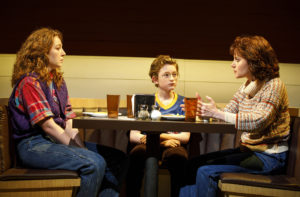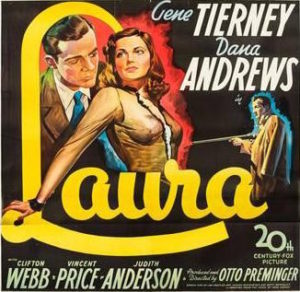 “When you call a man ‘too idealistic’ you admit that he has found the road, and in the end you will always be dragged after him.”
“When you call a man ‘too idealistic’ you admit that he has found the road, and in the end you will always be dragged after him.”
G.K. Chesterton, “The Right Way to Denounce Things” (Illustrated London News, June 29, 1912)
Terry Teachout on the arts in New York City
In today’s Wall Street Journal I review the off-Broadway premiere of Tracy Letts’ Mary Page Marlowe. Here’s an excerpt.
* * *
Tracy Letts is one of this country’s foremost writers, a playwright who is unafraid to explore the private lives of Americans of all kinds, from the sleazy trailer trash of “Killer Joe” to the freshly divorced misanthrope at the heart of “Linda Vista.” He is also a character actor of near-unique range who fills his plays with complex, richly nuanced roles. Yet nothing he had previously done prepared audiences for “Mary Page Marlowe,” first performed by the Steppenwolf Theatre Company in 2016, in which he used six different women (and a doll) to portray a seemingly ordinary Ohio accountant whose life is a scrapbook of what it means to be a woman in America. I called it “the most purely beautiful play that Mr. Letts has given us” in my review of the Chicago premiere, and now that it has reached New York in a new staging of identical merit, it looks—if possible—even more impressive.
 Mr. Letts’ 90-minute play, which is set between 1946 and 2015, is structured in a way that requires detailed explanation on paper. The six actors who play the title role (Blair Brown, Emma Geer, Mia Sinclair Jenness, Tatiana Maslany, Kellie Overbey, and Susan Pourfar) appear in ten of the 11 vignette-like scenes in which Mary Page is seen as a baby and at 12, 19, 27, 36, 40, 44, 50, 59, 63 and 69. Some scenes take place at key moments in her life—we see her in the hospital not long after she learns that she is going to die—while others appear at first glance to have been picked at random. Moreover, the scenes are not arranged chronologically but in an order of the author’s own devising….
Mr. Letts’ 90-minute play, which is set between 1946 and 2015, is structured in a way that requires detailed explanation on paper. The six actors who play the title role (Blair Brown, Emma Geer, Mia Sinclair Jenness, Tatiana Maslany, Kellie Overbey, and Susan Pourfar) appear in ten of the 11 vignette-like scenes in which Mary Page is seen as a baby and at 12, 19, 27, 36, 40, 44, 50, 59, 63 and 69. Some scenes take place at key moments in her life—we see her in the hospital not long after she learns that she is going to die—while others appear at first glance to have been picked at random. Moreover, the scenes are not arranged chronologically but in an order of the author’s own devising….
If this elaborate description makes “Mary Page Marlowe” sound like an avant-garde exercise in fractured narrative, be assured that it doesn’t play that way. It unfolds simply and intelligibly, proceeding according to a dramatic logic that makes total sense to the eye and ear. What we see before us is a woman who gradually comes to understand, however haltingly and imperfectly, who and what she is….
* * *
Read the whole thing here.
A PBS NewsHour feature about the 2016 Chicago premiere of Mary Page Marlowe:
 Titus Techera, who hosts a podcast for the American Cinema Foundation on which he and his guests discuss important films of the past and present, invited me back to talk about Otto Preminger’s Laura on his latest episode. (I appeared last month to talk about Vertigo.) Our hour-long chat is is now available on line. Titus and I spoke at length and in detail about several different aspects of Laura, including David Raksin’s score, the once-popular novel by Vera Caspary on which the film is based, and whether or not Laura qualifies as a true film noir. If, like me, you find Laura endlessly rewatchable, you might want to check out the results.
Titus Techera, who hosts a podcast for the American Cinema Foundation on which he and his guests discuss important films of the past and present, invited me back to talk about Otto Preminger’s Laura on his latest episode. (I appeared last month to talk about Vertigo.) Our hour-long chat is is now available on line. Titus and I spoke at length and in detail about several different aspects of Laura, including David Raksin’s score, the once-popular novel by Vera Caspary on which the film is based, and whether or not Laura qualifies as a true film noir. If, like me, you find Laura endlessly rewatchable, you might want to check out the results.
To listen to or download this episode, go here.
* * *
The original theatrical trailer for Laura, starring Dana Andrews, Gene Tierney, Clifton Webb, and Vincent Price, released in 1944:
 Jascha Heifetz and Emanuel Bay perform Paganini’s Caprice No. 24 in A Minor. The added piano accompaniment was supplied by Robert Schumann. This performance is an excerpt from Of Men and Music, directed by Alexander Hammid and Irving Reis and released in 1951:
Jascha Heifetz and Emanuel Bay perform Paganini’s Caprice No. 24 in A Minor. The added piano accompaniment was supplied by Robert Schumann. This performance is an excerpt from Of Men and Music, directed by Alexander Hammid and Irving Reis and released in 1951:
(This is the latest in a series of arts- and history-related videos that appear in this space each Monday, Wednesday, and Friday)
 Here’s my list of recommended Broadway, off-Broadway, and out-of-town shows, updated weekly. In all cases, I gave these shows favorable reviews (if sometimes qualifiedly so) in The Wall Street Journal when they opened. For more information, click on the title.
Here’s my list of recommended Broadway, off-Broadway, and out-of-town shows, updated weekly. In all cases, I gave these shows favorable reviews (if sometimes qualifiedly so) in The Wall Street Journal when they opened. For more information, click on the title.
BROADWAY:
• The Band’s Visit (musical, PG-13, all shows sold out last week, reviewed here)
• Dear Evan Hansen (musical, PG-13, all shows sold out last week, reviewed here)
• Hamilton (musical, PG-13, Broadway transfer of off-Broadway production, all shows sold out last week, reviewed here)
• My Fair Lady (musical, G, all shows sold out last week, reviewed here)
OFF BROADWAY:
• Carmen Jones (musical, PG-13, closes Aug. 19, reviewed here)
• On a Clear Day You Can See Forever (musical, G, too complex for children, closes Sept. 6, reviewed here)
• Symphonie Fantastique (abstract underwater puppet show, G, closes Sept. 2, reviewed here)
IN GARRISON, N.Y.:
• Richard II (Shakespeare, PG-13, closes Aug. 26, reviewed here)
• The Taming of the Shrew (Shakespeare, PG-13, closes Aug. 24, reviewed here)
IN NEW HOPE, PA.:
• 42nd Street (musical, G, closes Aug. 4, reviewed here)
CLOSING SATURDAY OFF BROADWAY:
• Conflict (drama, PG-13, reviewed here)
 “PEDANTRY may be defined, for the purpose of this book, as the saying of things in language so learned or so demonstratively accurate as to imply a slur upon the generality, who are not capable or not desirous of such displays. The term, then, is obviously a relative one; my pedantry is your scholarship, his reasonable accuracy, her irreducible minimum of education, & someone else’s ignorance.”
“PEDANTRY may be defined, for the purpose of this book, as the saying of things in language so learned or so demonstratively accurate as to imply a slur upon the generality, who are not capable or not desirous of such displays. The term, then, is obviously a relative one; my pedantry is your scholarship, his reasonable accuracy, her irreducible minimum of education, & someone else’s ignorance.”
H.W. Fowler, A Dictionary of Modern English Usage
An ArtsJournal Blog